- Clone
- MIH3 (See other available formats)
- Regulatory Status
- RUO
- Other Names
- Programmed cell death ligand 1 (PD-L1), B7 homolog 1 (B7-H1), B7-H, B7H1, PDL1, PDCD1L1, PDCD1LG1
- Isotype
- Mouse IgG1, κ
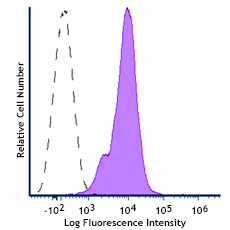
-

Human PBMCs were activated for 3 days with PHA and then stained with anti-human CD274 (clone MIH3) APC/Fire™ 810 (filled histogram) or mouse IgG1, κ APC/Fire™ 810 isotype control (open histogram).
| Cat # | Size | Price | Quantity Check Availability | ||
|---|---|---|---|---|---|
| 374515 | 25 tests | $176.00 | |||
| 374516 | 100 tests | $429.00 | |||
CD274, also known as PD-L1 and B7-H1, is type I transmembrane glycoprotein that serves as a ligand for CD279 (PD-1). This interaction is believed to regulate the balance between the stimulatory and inhibitory signals needed for responses to microbes and maintenance of self-tolerance. CD274 is involved in the costimulation of T cell proliferation and IL-10 and IFN-γ production in an IL-2-dependent and CD279-independent manner. Conflicting data has shown that CD274 can inhibit T cell proliferation and cytokine production, and alternatively, enhance T cell activation. Other studies suggest that CD274 may signal bidirectionally, raising interesting implications for its expression in a wide variety of cell types, including T and B cells, antigen-presenting cells, and non-hematopoietic cells.
Product Details
- Verified Reactivity
- Human
- Antibody Type
- Monoclonal
- Host Species
- Mouse
- Immunogen
- Human PD-L1-transfected cells.
- Formulation
- Phosphate-buffered solution, pH 7.2, containing 0.09% sodium azide and BSA (origin USA)
- Preparation
- The antibody was purified by affinity chromatography and conjugated with APC/Fire™ 810 under optimal conditions.
- Concentration
- Lot-specific (to obtain lot-specific concentration and expiration, please enter the lot number in our Certificate of Analysis online tool.)
- Storage & Handling
- The antibody solution should be stored undiluted between 2°C and 8°C, and protected from prolonged exposure to light. Do not freeze.
- Application
-
FC - Quality tested
- Recommended Usage
-
Each lot of this antibody is quality control tested by immunofluorescent staining with flow cytometric analysis. For flow cytometric staining, the suggested use of this reagent is 5 µL per million cells in 100 µL staining volume or 5 µL per 100 µL of whole blood. It is recommended that the reagent be titrated for optimal performance for each application.
* APC/Fire™ 810 has a maximum excitation of 650 nm and a maximum emission of 810 nm.
Excessive exposure to light, and commonly used fixation, permeabilization buffers can affect APC/Fire™ 810 fluorescence signal intensity and spread. Please keep conjugates protected from light exposure. For more information and representative data, visit our Fire Dyes page. - Excitation Laser
-
Red Laser (633 nm)
- Application Notes
-
Additional reported applications (for the relevant formats) include blocking1, 2.
Clone MIH3 blocks the binding of PD-L1 with PD-1 , but did not block the binding of PD-L1 with B7-1 (CD80). -
Application References
(PubMed link indicates BioLegend citation) -
- Haile S.T, et al. 2014. Cancer Immunol Res. 2:1. (Block)
- Butte M.J, et al. 2008. Mol Immunol. 45:3567. (Block)
- RRID
-
AB_2927810 (BioLegend Cat. No. 374515)
AB_2927810 (BioLegend Cat. No. 374516)
Antigen Details
- Structure
- Type 1 transmembrane protein, member of the B7 family, 40kD.
- Distribution
-
T cells, B cells, NK cells, monocytes/macrophages, granulocytes and dendritic cells.
- Function
- CD274 is involved in the costimulatory signal, essential for T lymphocyte proliferation and production of IL-10 and IFN-γ, in an IL-2-dependent and a PD-1-CD1-independent manner. Its interaction with PD-1-CD1 inhibits T-cell proliferation and cytokine production.
- Ligand/Receptor
- PD-1 (CD279), B7-1 (CD80).
- Cell Type
- T cells, B cells, NK cells, Monocytes, Macrophages, Granulocytes, Dendritic cells
- Biology Area
- Immunology, Cancer Biomarkers, Costimulatory Molecules
- Molecular Family
- Adhesion Molecules, CD Molecules, Immune Checkpoint Receptors
- Antigen References
-
1. Khan AR, et al. 2015. Nat Commun. 6:5997.
2. Kiyasu J, et al. 2015. Blood. 126:2193.
3. Herold M, et al. 2015 J Immunol. 195:3584.
4. Buddhisa S, et al. 2015. J Immunol. 194:4413. - Gene ID
- 29126 View all products for this Gene ID
- UniProt
- View information about CD274 on UniProt.org
Other Formats
View All CD274 Reagents Request Custom Conjugation| Description | Clone | Applications |
|---|---|---|
| Ultra-LEAF™ Purified anti-human CD274 (B7-H1, PD-L1) | MIH3 | FC,Block |
| PE/Cyanine7 anti-human CD274 (B7-H1, PD-L1) | MIH3 | FC |
| Brilliant Violet 421™ anti-human CD274 (B7-H1, PD-L1) | MIH3 | FC |
| PE anti-human CD274 (B7-H1, PD-L1) | MIH3 | FC |
| FITC anti-human CD274 (B7-H1, PD-L1) | MIH3 | FC |
| APC anti-human CD274 (B7-H1, PD-L1) | MIH3 | FC |
| APC/Fire™ 810 anti-human CD274 (B7-H1,PD-L1) | MIH3 | FC |
| PerCP/Fire™ 806 anti-human CD274 (B7-H1, PD-L1) | MIH3 | FC |
| PerCP/Fire™ 780 anti-human CD274 (B7-H1, PD-L1) | MIH3 | FC |
Compare Data Across All Formats
This data display is provided for general comparisons between formats.
Your actual data may vary due to variations in samples, target cells, instruments and their settings, staining conditions, and other factors.
If you need assistance with selecting the best format contact our expert technical support team.
-
Ultra-LEAF™ Purified anti-human CD274 (B7-H1, PD-L1)
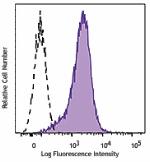
Human PBMCs were activated for 3 days with PHA and then stai... -
PE/Cyanine7 anti-human CD274 (B7-H1, PD-L1)
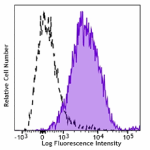
Human PBMCs were activated for 3 days with PHA and then stai... -
Brilliant Violet 421™ anti-human CD274 (B7-H1, PD-L1)
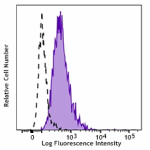
Human PBMCs were activated for 3 days with PHA and then stai... -
PE anti-human CD274 (B7-H1, PD-L1)

Human peripheral blood lymphocytes were activated for 3 days... -
FITC anti-human CD274 (B7-H1, PD-L1)

Human peripheral blood lymphocytes were activated for 3 days... -
APC anti-human CD274 (B7-H1, PD-L1)

Human peripheral blood lymphocytes were activated for 3 days... -
APC/Fire™ 810 anti-human CD274 (B7-H1,PD-L1)
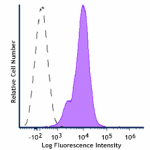
Human PBMCs were activated for 3 days with PHA and then stai... -
PerCP/Fire™ 806 anti-human CD274 (B7-H1, PD-L1)

PHA-stimulated (three days) human peripheral blood lymphocyt... -
PerCP/Fire™ 780 anti-human CD274 (B7-H1, PD-L1)

Human peripheral blood mononuclear cells were activated for ...
